anxiety & aggression support
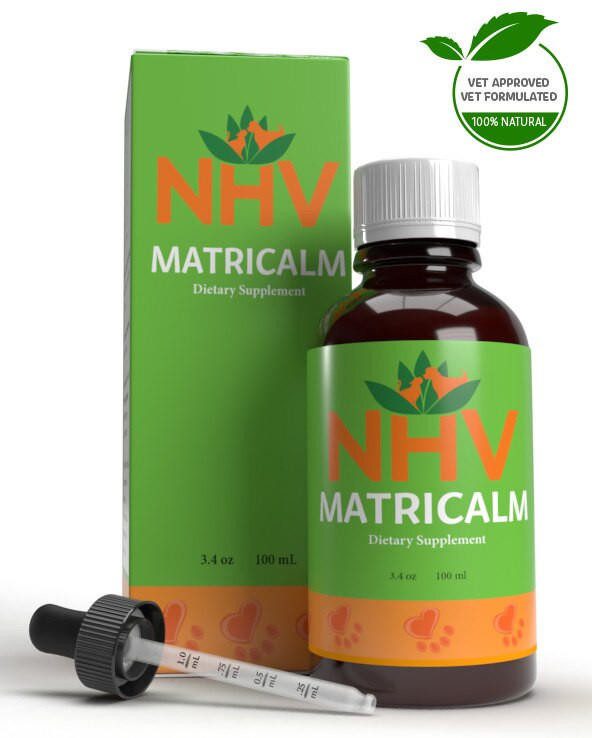
free shipping over $100 (USA & Canada)
1-877-937-4372 the pet expert hotline
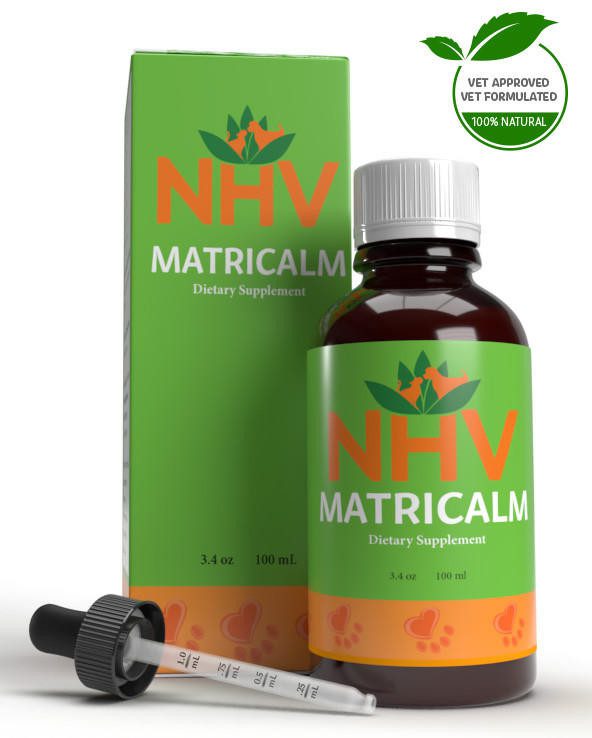
Natural Help for Stress Reduction, Anxiety Relief, Behavioral Problems, and Aggression in Cats

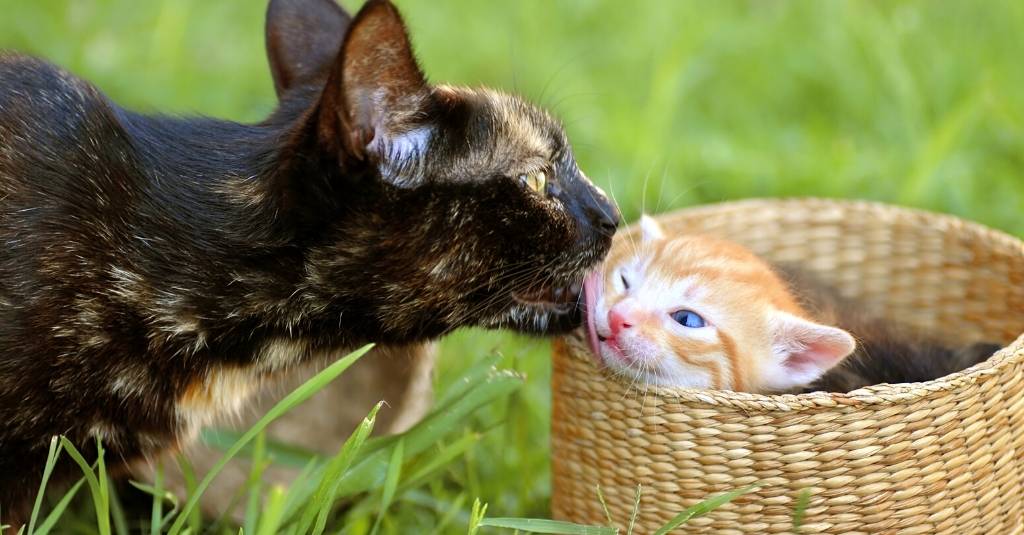
Everything is in order. And then suddenly… life happens. A new season. A new pet. A new family member. A new house. A new job. A new routine for the holidays. Each time we change, we get to add a little stress to our platter. But sometimes we just need to trust the magic of change. Change doesn’t have to be stressful. With a little natural help and lots of TLC. Change can be PAWsome.
Four changes or situations that every pet household faces and how you can make them easy and enjoyable for your fur companion:
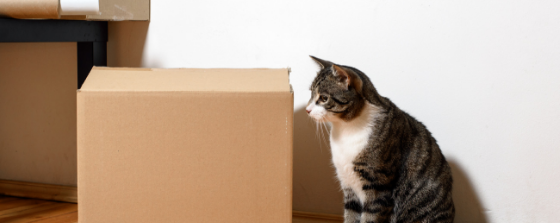
Besides worrying about the nearest grocery stores, transit, packing, and unpacking, pet parents have another worry, and that’s the biggest one too! The stress the move is going to bring to their pets. A soon as you start bringing in empty boxes, there’ll be something disarray about their behavior. They will poop in odd spots (More work, ugh) or eat unusually less or more. They will be more anxious every time you step out – you know they can sense a change coming! Here’s how you can tackle this situation better:
1. Before you even call in the movers, find your pets a confined space and let them feel at home in it. It could be a small room or even an airy closure that you make using partitions or baby gates. Get them to play in this room, eat and nap in it. A lot of strangers will be in and out of the house, you and your pets will both be less stressed knowing that your pets are in an area safe and calm.
2. Keep some of your used and unwashed clothes around them at all times. Your frequently worn jackets or scarfs smell like you and this smell brings your pet comfort. You can even slip one into their carrier on the day of the move. Many people make the mistake of getting new toys and clothes for the pets to reward them in the new place. It is recommended to stick to older belongings until they are completely at home.
3. Start altering their peeing, pooping, and eating routines according to the travel time ahead. Most pets eat twice a day and poop on a schedule. If you are an organized pet parent then the timings for these are more or less fixed. During the move, these timings might need to change. You could be on a flight or in a car or at an Airbnb for a few days. It’s best to start tweaking their routines well in advance, and a little at a time. Try to bring them to the desired pooping, peeing, and feeding times at least 10 days before the big day.
4. Get them used to the carrier they will be traveling in. Let them sleep in it from a few days before. Put their toys, your clothing, and their blankies in it. If the carrier will be going with you in a car or in a flight, try to recreate the situation for them. The carrier can also be their bed in the new place for a few days.
5. Start to administer NHV Matricalm early and raise the doses on hectic days. NHV Matricalm is a herbal blend that helps reduce stress and anxiety. Start administering it ideally 3-4 weeks advance and on the days of the move, you can safely double the dose to help keep them stress-free and comfortable.
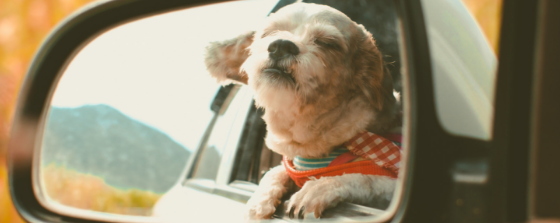
Seasonal changes are synonymous with allergies – sneezes, coughs, cold and pinkish skin. Spring brings out icky worms, fall brings rain and mold, and winter? Winter brings out the worst. Brrrrr. Sore joints! There’s a lot that you can do to make these changes easier for your pet to cope with:
1. What you feed your pet as seasons change makes all the difference. Tuna, salmon, and mackerel have Omega-3 fatty acids that help boost immunity. Kefir is a yogurt that contains probiotics that are helpful for digestion. Bone broth is an excellent snack or food toping for pets, especially in the colder seasons. Little tweaks in their diet around changing seasons can help your pet cope better. Get your vet to make some diet recommendations for your pet’s breed and age every new season, or you can even get a customized diet plan from our in-house vet Dr. Amanda. NHV Multi Essentials is a herbal multivitamin that helps fill dietary gaps and provides a pet’s body with all the nutrients it needs, each season.
2. Sudden changes in temperatures can lead to stiff joints and cold/congestion. You want to turn off the heat before heading out to walkies in the snow. You want to wait a little longer before turning it on again, once back. Cats and dogs love the sun, so make sure you draw the curtains and let their bodies soak in the sunlight, every day.
3. Natural support for allergies for the two months of change can save you trips to the vet later. NHV Alge-ex is an excellent herbal blend that works as a natural anti-histamine and helps reduce symptoms of allergies like sneezing and watery eyes. NHV Ouch Away Spray works topically for any skin allergies or breakouts. It helps reduce itchiness and inflammation. NHV Stimmune works like a natural antibiotic and is especially useful if your pet has pinkish skin or is showing signs of food allergies.
4. Your cleaning supplies should be pet-friendly, especially around the time seasons change. Laundry detergents, air fresheners, diffusers, and any surface cleaners should be picked carefully to make sure they don’t spur your pet’s allergies.
5. Sore and stiff joints should be supported with a healthy balanced diet complete with herbal supplements like NHV Turmeric, NHV Old Timer, and NHV PetOmega 3 at all times. Some smaller breeds with short fur coats require a light layer throughout the winter season.
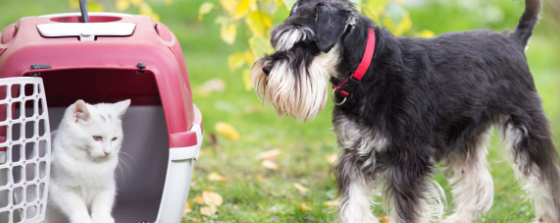
A new member can be anyone – your partner moving in, a newborn in your family, or a new pet you adopted. All these news can be stressful for your existing pet. Try to make the transition slow and rewarding.
1. Take baby steps, literally. A new pet should be kept in a crate and slowly introduced to the older pet. Similarly, a new person should be introduced over time. Maybe a few playtime dates and then staying over and then finally moving in. Give your pet the time to adjust and accept. It should not feel threatened by this new being.
2. As you introduce your pet to someone new, every meeting or every step forward should be rewarded with a special treat and extra cuddles. Your pet should learn to associate the new member with treats and happiness. Celebrate every little milestone. You can use NHV Matricalm during the process of introduction.
3. Give them the same attention as always. We understand with a little baby in the crib or with a cute puppy around the house, it is very difficult to make time for your older pet, but try to give your older pet the same attention. A good way to strike a balance is to start reducing your exclusive time with your older pet from earlier. This way he will not find it weird when you can’t make time for him once the baby or the new kitten or puppy is here; don’t let your older pet feel ignored. Do the same routine things with him as you have been doing in the past month.
4. Sounds first, then smells, and then the baby. It helps to play baby sounds in the house and let your pet associate the sounds with happy vibes. You can then start introducing smell by bringing in the baby’s clothes or toys to your pet’s corner/room. Gradually, you will be able to bring the two together, PAWsitively.
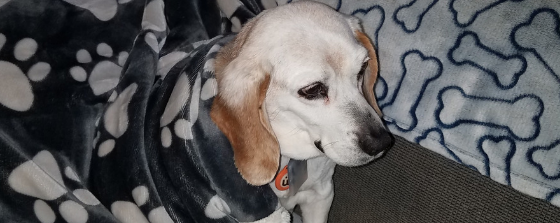
As our pets grow old, we notice little changes. They spend less time playing with their favorite toys and they have a harder time chewing certain treats they used to love. They might not follow you around everywhere. They may get clingy or a little grumpy. These changes are important to prepare for:
1. Light exercises for physical and mental stimulation are important for both, senior cats and senior dogs. You can make them solve puzzles, teach them new skills, keep them busy with some amazing pet gadgets that are out there; they help keep them stress-free and active as their age starts to slow them down.
2. Diet changes are very important for senior pets. Your vet can help you decide which diet is most suitable for your old cat or dog. Many older cats suffer from kidney disease and thyroid imbalances. The right diet and supplementation can help them stay as healthy as can be, naturally. Understand your pet’s breed and ask your NHV Pet Expert to help you find a supplement accordingly. Dr. Amanda from NHV can also help you with a customized diet plan that can help your senior pet adapt best to the changes old age brings.
3. Supplements for joint health are almost essential for all pets. Every dog or cat at some point will experience joint discomfort. The degree of discomfort or inflammation can vary from breed to breed and case to case, but it is almost certain that a senior cat having trouble jumping onto the cat tree or a dog yowling when being touched around the limbs, is arthritis kicking in. NHV has many natural, vet-formulated supplements and herbal extracts that can help make these changes easier for senior pets to cope with. In fact, the joints problems kit is a great way to get started.
4. Separation anxiety in older pets is a serious concern. As they grow old they tend to get more insecure or needy. You will notice them howling or crying for attention the moment you step out of the house. Stress is harmful to pets of all ages, but for older pets, it is most damaging. Try to keep their stress levels at a minimum, by giving them a comfortable space to rest in and playing some soothing music when you are gone. NHV Matricalm works wonderfully in such situations. It helps reduce the stress and make any troublesome situation easier for them to bear.
It is important to get your cat or dog’s dental checkups regularly.
5. Dental health and heart health are linked so closely. You will notice when your senior pet starts to chew slower or they might even have a bad mouth odor, worse than usual. It is important to get your cat or dog’s dental checkups regularly. NHV Mouth drops are completely natural and can be dropped onto their gums and teeth to reduce inflammation and discomfort. Using them regularly can offer some proactive care for your senior pet. Act before the changes even start showing.
We are here to help you with proactive pet parenting. The right diet, supplements, and care can help you embrace all the changes that life throws at you, with open arms. Let’s not forget that changes often bring some great memories and beautiful beginnings. Let NHV help you make change PAWsome!
anxiety & aggression support

For stress, anxiety, behavioral problems in birds
buy 2 and save $3
3 month supply for a small to medium size pet

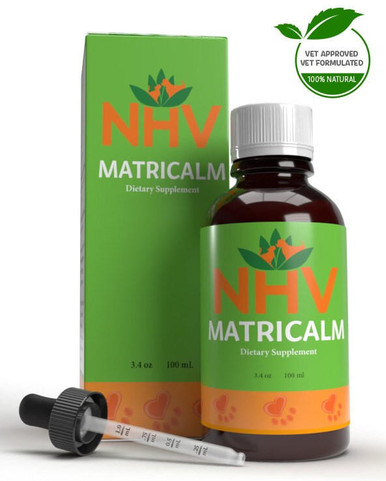

Birds can be prone to stress and anxiety, which can lead to other health conditions such as feather plucking. Help to reduce stress and anxiety in your bird with Matricalm, a natural herbal product designed to help reduce excitability in your pet.
Chamomile – Contains sedative properties.
Passion Flower – An effective, non-addictive sedative.
Lemon Balm – An aromatic herb used for nervous disorders, excitability, and anxiety.
Valerian – Stops heart palpitations, relaxes spasms, relieves pain, and regulates the nervous system.
Hops – Eases tension and anxiety in pets.
For birds: 1 drop per two pounds twice a day
How to Administer
Shake well before use. The easiest method is to use the dropper provide and place the drops into your bird's favorite treat. You can also use the dropper and squirt directly into the bird’s mouth.
For Best Results
Herbal dietary supplements are beneficial to the health and wellbeing of your pet and are safe for long-term use. Every pet responds to natural herbal supplements differently, therefore it is important to be consistent and administer the product daily. Supplements generally take two to four weeks to take effect, however this will vary from one animal to the next.
Product Storage
All NHV Natural Pet Products are pure herbal extracts and contain no artificial additives, preservatives or coloring. Shelf life after opening is 6 months and must be refrigerated after opening.
Cautions and Contraindications
Do not use Matricalm in pregnant or nursing animals. Speak to your vet before using our products. A second visit is recommended if your pet’s condition does not improve, or deteriorates after continued use of the supplements.
All information provided by NHV Natural Pet Products is for educational purposes only.
Birds can be prone to stress and anxiety, which can lead to other health conditions such as feather plucking. Help to reduce stress and anxiety in your bird with Matricalm, a natural herbal product designed to help reduce excitability in your pet.
Chamomile – Contains sedative properties.
Passion Flower – An effective, non-addictive sedative.
Lemon Balm – An aromatic herb used for nervous disorders, excitability, and anxiety.
Valerian – Stops heart palpitations, relaxes spasms, relieves pain, and regulates the nervous system.
Hops – Eases tension and anxiety in pets.
For birds: 1 drop per two pounds twice a day
How to Administer
Shake well before use. The easiest method is to use the dropper provide and place the drops into your bird's favorite treat. You can also use the dropper and squirt directly into the bird’s mouth.
For Best Results
Herbal dietary supplements are beneficial to the health and wellbeing of your pet and are safe for long-term use. Every pet responds to natural herbal supplements differently, therefore it is important to be consistent and administer the product daily. Supplements generally take two to four weeks to take effect, however this will vary from one animal to the next.
Product Storage
All NHV Natural Pet Products are pure herbal extracts and contain no artificial additives, preservatives or coloring. Shelf life after opening is 6 months and must be refrigerated after opening.
Cautions and Contraindications
Do not use Matricalm in pregnant or nursing animals. Speak to your vet before using our products. A second visit is recommended if your pet’s condition does not improve, or deteriorates after continued use of the supplements.
All information provided by NHV Natural Pet Products is for educational purposes only.
anxiety & aggression support
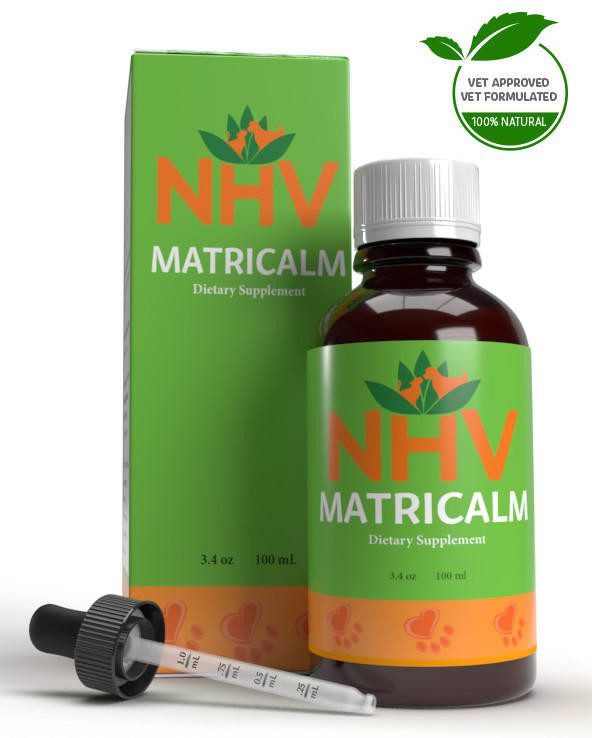
Support for Anxiety and Aggressive Behavior
buy 2 and save $3
3 month supply for a small to medium size pet
Help calm your dog with Matricalm, a supplement for relaxing nervousness and aggressive behavior in canines through herbal ingredients.
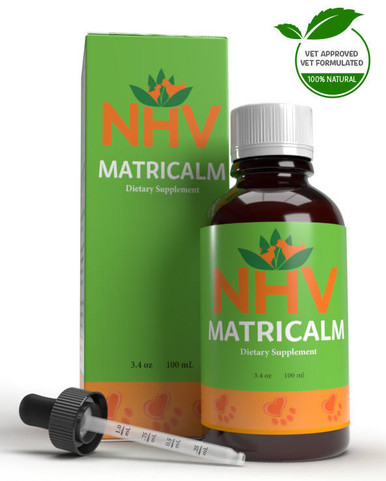
Help calm your dog with Matricalm, a supplement for relaxing nervousness and aggressive behavior in canines through herbal ingredients.
A Calming Supplement for Dogs
Dogs can become anxious or aggressive when exposed to other animals or to people they are unfamiliar with. Separation from an owner or a move to a new home can also trigger troubling symptoms including excessive barking, chewing, and inappropriate urination. A calming dog supplement can help your pet through these situations.
How Matricalm Calms Your Dog
Matricalm is formulated with powerful, natural ingredients that will help put your dog at ease. Ingredients like Chamomile, Passion Flower, and Hops have non-addictive sedative properties.
Ingredients like Lemon Balm and Valerian are especially helpful in easing anxiety. Your dog will find it easier to behave during times of stress, and may even be more receptive to training.
Use Matricalm to help ease anxiety in your dog, as a supplement for dog aggression, and to help reduce excitability in your pet.
Help Calm Your Dog Naturally
NHV supplements are formulated with all-natural ingredients by expert veterinarians with 20+ years of experience. They’re perfectly fine to take together with prescribed medications. Try Matricalm, the natural calming supplement for dogs, and see the difference it makes for you and your pet.
Chamomile – Contains sedative properties.
Passion Flower – An effective, non-addictive sedative.
Lemon Balm – An aromatic herb used for nervous disorders, excitability, and anxiety.
Valerian – Stops heart palpitations, relaxes spasms, relieves pain, and regulates the nervous system.
Hops – Eases tension and anxiety in pets.
Select your pet's weight to determine the correct dose.
To be taken twice daily. Determine your pet’s weight and then use the easy chart below to determine the correct dose. This is the minimum dosage.
Pet's Weight Dosage
0 - 15 lb = 0.5 ml
16 - 30 lb = 1.0 ml
31 - 45 lb = 1.5 ml
46 - 60 lb = 2.0 ml
61 - 75 lb = 2.5 ml
Over 75 lb = 3.0 ml
How to Administer
Shake well before use.
The easiest method is to use the dropper provide and places the drops into your pet’s food or favorite treat. You can also use the dropper and squirt directly into the pet’s mouth.
Some pets can be finicky, if this occurs consider hiding the drops in foods most pet’s love such as fish, chicken or yogurt or a favorite treat. If your pet only eats dry food then soak a few kibbles at feeding time.
For Best Results
Herbal dietary supplements are beneficial to the health and wellbeing of your pet and are safe for long-term use. Every pet responds to natural herbal supplements differently, therefore it is important to be consistent and administer the product daily. Supplements generally take two to four weeks to take effect, however this will vary from one animal to the next.
Product Storage
All NHV Natural Pet Products are pure herbal extracts and contain no artificial additives, preservatives or coloring. Shelf life after opening is 6 months and must be refrigerated after opening.
Cautions and Contraindications
Do not use Matricalm in pregnant or nursing animals.
Speak to your vet before using our products. A second visit is recommended if your pet’s condition does not improve, or deteriorates after continued use of the supplements.
All information provided by NHV Natural Pet Products is for educational purposes only.
A Calming Supplement for Dogs
Dogs can become anxious or aggressive when exposed to other animals or to people they are unfamiliar with. Separation from an owner or a move to a new home can also trigger troubling symptoms including excessive barking, chewing, and inappropriate urination. A calming dog supplement can help your pet through these situations.
How Matricalm Calms Your Dog
Matricalm is formulated with powerful, natural ingredients that will help put your dog at ease. Ingredients like Chamomile, Passion Flower, and Hops have non-addictive sedative properties.
Ingredients like Lemon Balm and Valerian are especially helpful in easing anxiety. Your dog will find it easier to behave during times of stress, and may even be more receptive to training.
Use Matricalm to help ease anxiety in your dog, as a supplement for dog aggression, and to help reduce excitability in your pet.
Help Calm Your Dog Naturally
NHV supplements are formulated with all-natural ingredients by expert veterinarians with 20+ years of experience. They’re perfectly fine to take together with prescribed medications. Try Matricalm, the natural calming supplement for dogs, and see the difference it makes for you and your pet.
Chamomile – Contains sedative properties.
Passion Flower – An effective, non-addictive sedative.
Lemon Balm – An aromatic herb used for nervous disorders, excitability, and anxiety.
Valerian – Stops heart palpitations, relaxes spasms, relieves pain, and regulates the nervous system.
Hops – Eases tension and anxiety in pets.
Select your pet's weight to determine the correct dose.
To be taken twice daily. Determine your pet’s weight and then use the easy chart below to determine the correct dose. This is the minimum dosage.
Pet's Weight Dosage
0 - 15 lb = 0.5 ml
16 - 30 lb = 1.0 ml
31 - 45 lb = 1.5 ml
46 - 60 lb = 2.0 ml
61 - 75 lb = 2.5 ml
Over 75 lb = 3.0 ml
How to Administer
Shake well before use.
The easiest method is to use the dropper provide and places the drops into your pet’s food or favorite treat. You can also use the dropper and squirt directly into the pet’s mouth.
Some pets can be finicky, if this occurs consider hiding the drops in foods most pet’s love such as fish, chicken or yogurt or a favorite treat. If your pet only eats dry food then soak a few kibbles at feeding time.
For Best Results
Herbal dietary supplements are beneficial to the health and wellbeing of your pet and are safe for long-term use. Every pet responds to natural herbal supplements differently, therefore it is important to be consistent and administer the product daily. Supplements generally take two to four weeks to take effect, however this will vary from one animal to the next.
Product Storage
All NHV Natural Pet Products are pure herbal extracts and contain no artificial additives, preservatives or coloring. Shelf life after opening is 6 months and must be refrigerated after opening.
Cautions and Contraindications
Do not use Matricalm in pregnant or nursing animals.
Speak to your vet before using our products. A second visit is recommended if your pet’s condition does not improve, or deteriorates after continued use of the supplements.
All information provided by NHV Natural Pet Products is for educational purposes only.
stress & anxiety support
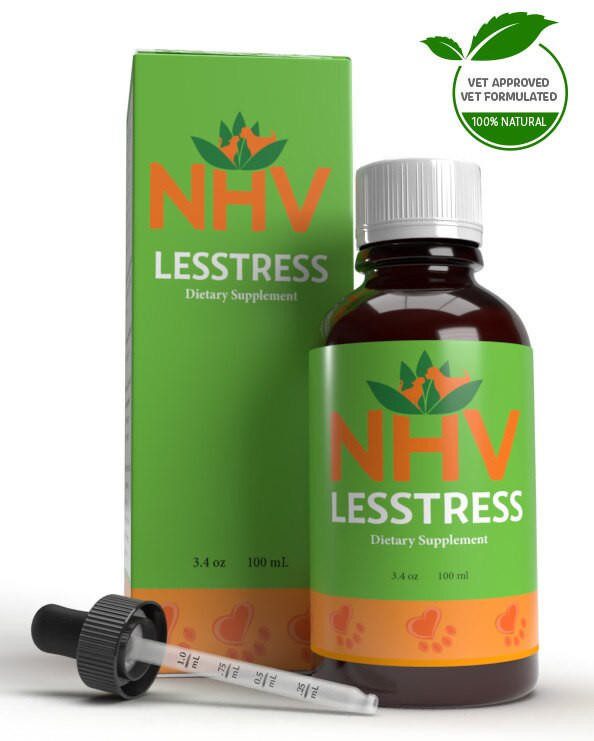
Natural Support for Canine Stress and Anxiety
buy 2 and save $3
3 month supply for a small to medium size pet
Everyone knows what stress feels like, and we all know that too much stress can make us ill—high blood pressure, ulcers and even cancer can result from excessive stress. Like us, dogs can get stressed by numerous factors as well. Help your furkiddo relax into a long and happy life with NHV Lesstress - a natural dog stress support.

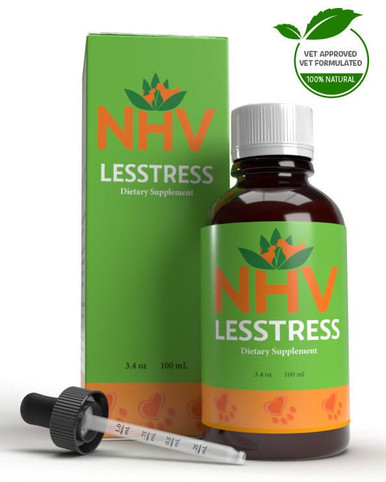
Everyone knows what stress feels like, and we all know that too much stress can make us ill—high blood pressure, ulcers and even cancer can result from excessive stress. Like us, dogs can get stressed by numerous factors as well. Help your furkiddo relax into a long and happy life with NHV Lesstress - a natural dog stress support.

Natural Dog Stress Reliever Supplemental Support
With a heightened sense of hearing and smell, small events that seem mundane to us can be terrifying and stressful for your dogs. Sometimes the stress is from the ride to the office, or maybe they are missing their human companions. This all contributes to changes in behavior like excessive panting, drooling, sweaty paws, dilated eyes, pacing, excessively shedding, or just completely shutting down. Some dogs become so stressed that it may lead to fear and aggression.
Other forms of stress in a dog’s life include:
In addition to panting, excessive barking/whining, chewing on themselves, shivering (when it’s not cold), panicked tail wagging, or tense muscles, stress can also cause GI tract issues such as diarrhea or vomiting.
The key to a healthy pup is balance. Too much or too little activity can be harmful, as well as too much or too little socialization. A balanced, clean diet also helps maintain the body and the mind. If your dog is susceptible to stress, you can use calming herbs like those found in NHV Lesstress. This formulation gently acts on the nervous system and immune system to provide a natural dog stress reliever.
How NHV’s Natural Dog Stress Relief Eases Stress and Anxiety
For stressful experiences such as separation anxiety, the loss or addition of a furry friend, special events (eg. fireworks) and illness (stress can cause conditions to worsen), the natural (non-addictive) sedative properties of Lesstress gently relax the nervous system and endocrine system. Ingredients like Chamomile, Passion Flower and Lemon Balm work to calm nerves while ingredients like Reishi, Eleuthero, and Echinacea Angustifolia are very beneficial for helping the body adapt to stress and illness and stimulate healthy immune function.
Help Support Your Dog Naturally
All NHV supplements like Lesstress are 100% natural and created by a holistic veterinarian and a master herbalist, specially formulated for pets. Feel free to contact our veterinary professionals to get more insight into your little one’s health and wellbeing.
Made with the finest, organically grown, or ethically harvested herbs. Made specifically for pets, vet-formulated and vet approved.
Lesstress for Dogs
Select your pet's weight to determine the correct dose.
To be taken twice daily. Determine your pet’s weight and then use the easy chart below to determine the correct dose. This is the minimum dosage.
Pet's Weight Dosage
0 - 15 lb = 0.5 ml
16 - 30 lb = 1.0 ml
31 - 45 lb = 1.5 ml
46 - 60 lb = 2.0 ml
61 - 75 lb = 2.5 ml
Over 75 lb = 3.0 ml
For small animals (rabbits, ferrets), avians and reptiles use 1 drop for every 2 lb of body weight.
How to Administer
Shake well before use.
The easiest method is to use the dropper provide and places the drops into your pet’s food or favorite treat. You can also use the dropper and squirt directly into the pet’s mouth.
Some pets can be finicky, if this occurs consider hiding the drops in foods most pet’s love such as fish, chicken or yogurt or a favourite treat. If your pet only eats dry food then soak a few kibbles at feeding time.
For Best Results
Herbal dietary supplements are beneficial to the health and wellbeing of your pet and are safe for long-term use. Every pet responds to natural herbal supplements differently, therefore it is important to be consistent and administer the product daily. Supplements generally take two to four weeks to take effect, however this will vary from one animal to the next.
Product Storage
All NHV Natural Pet Products are pure herbal extracts and contain no artificial additives, preservatives or coloring. Shelf life after opening is 6 months and must be refrigerated after opening.
Cautions and Contraindications
Do not use Lesstress in pregnant or nursing animals.
Speak to your vet before using our products. A second visit is recommended if your pet’s condition does not improve, or deteriorates after continued use of the supplements.
All information provided by NHV Natural Pet Products is for educational purposes only.
Natural Dog Stress Reliever Supplemental Support
With a heightened sense of hearing and smell, small events that seem mundane to us can be terrifying and stressful for your dogs. Sometimes the stress is from the ride to the office, or maybe they are missing their human companions. This all contributes to changes in behavior like excessive panting, drooling, sweaty paws, dilated eyes, pacing, excessively shedding, or just completely shutting down. Some dogs become so stressed that it may lead to fear and aggression.
Other forms of stress in a dog’s life include:
In addition to panting, excessive barking/whining, chewing on themselves, shivering (when it’s not cold), panicked tail wagging, or tense muscles, stress can also cause GI tract issues such as diarrhea or vomiting.
The key to a healthy pup is balance. Too much or too little activity can be harmful, as well as too much or too little socialization. A balanced, clean diet also helps maintain the body and the mind. If your dog is susceptible to stress, you can use calming herbs like those found in NHV Lesstress. This formulation gently acts on the nervous system and immune system to provide a natural dog stress reliever.
How NHV’s Natural Dog Stress Relief Eases Stress and Anxiety
For stressful experiences such as separation anxiety, the loss or addition of a furry friend, special events (eg. fireworks) and illness (stress can cause conditions to worsen), the natural (non-addictive) sedative properties of Lesstress gently relax the nervous system and endocrine system. Ingredients like Chamomile, Passion Flower and Lemon Balm work to calm nerves while ingredients like Reishi, Eleuthero, and Echinacea Angustifolia are very beneficial for helping the body adapt to stress and illness and stimulate healthy immune function.
Help Support Your Dog Naturally
All NHV supplements like Lesstress are 100% natural and created by a holistic veterinarian and a master herbalist, specially formulated for pets. Feel free to contact our veterinary professionals to get more insight into your little one’s health and wellbeing.
Made with the finest, organically grown, or ethically harvested herbs. Made specifically for pets, vet-formulated and vet approved.
Lesstress for Dogs
Select your pet's weight to determine the correct dose.
To be taken twice daily. Determine your pet’s weight and then use the easy chart below to determine the correct dose. This is the minimum dosage.
Pet's Weight Dosage
0 - 15 lb = 0.5 ml
16 - 30 lb = 1.0 ml
31 - 45 lb = 1.5 ml
46 - 60 lb = 2.0 ml
61 - 75 lb = 2.5 ml
Over 75 lb = 3.0 ml
For small animals (rabbits, ferrets), avians and reptiles use 1 drop for every 2 lb of body weight.
How to Administer
Shake well before use.
The easiest method is to use the dropper provide and places the drops into your pet’s food or favorite treat. You can also use the dropper and squirt directly into the pet’s mouth.
Some pets can be finicky, if this occurs consider hiding the drops in foods most pet’s love such as fish, chicken or yogurt or a favourite treat. If your pet only eats dry food then soak a few kibbles at feeding time.
For Best Results
Herbal dietary supplements are beneficial to the health and wellbeing of your pet and are safe for long-term use. Every pet responds to natural herbal supplements differently, therefore it is important to be consistent and administer the product daily. Supplements generally take two to four weeks to take effect, however this will vary from one animal to the next.
Product Storage
All NHV Natural Pet Products are pure herbal extracts and contain no artificial additives, preservatives or coloring. Shelf life after opening is 6 months and must be refrigerated after opening.
Cautions and Contraindications
Do not use Lesstress in pregnant or nursing animals.
Speak to your vet before using our products. A second visit is recommended if your pet’s condition does not improve, or deteriorates after continued use of the supplements.
All information provided by NHV Natural Pet Products is for educational purposes only.
Published: November 9, 2018